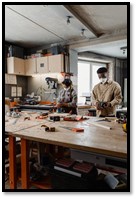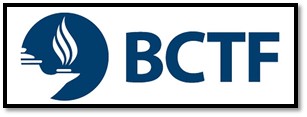Workers' Stories in the COVID-19 Era: Installment #17
March 22, 2022
Written by Christina Love (Undergraduate Student, Indigenous Studies and French)
In the seventeenth installment of our series Workers' Stories in the COVID-19 Era, we interviewed Paulo, a teacher in British Columbia who has worked throughout the pandemic. The perspectives they share highlight the importance of having a strong union like theirs representing workers. The British Columbia Teachers Federation (BCTF) has been a cornerstone to pandemic response in the field of education. Paulo shares that they believe sick leave and better communication are key to addressing public health crises and are rights that workers should have in general. They conclude this installment by reflecting on the relative privilege teachers have experienced when compared to workers in other sectors.
For privacy, all names have been changed to protect the identities of our interviewees.
Interview
Christina: Can you describe your job, how long you’ve been working there, and in the field, and go over some typical tasks/duties?

Paulo: I am a high school shop teacher and have been in the education field for over a decade now. Prior to teaching shop, I was involved working for my union as an elected representative for a few years and I was a math and science teacher before that. I work in a pretty small and remote district, which has made the work more flexible in some regards and more stressful in others.
I work in a pretty small and remote district, which has made the work more flexible in some regards and more stressful in others.
Currently during the pandemic, my job has consisted of going in-person, barring at the very beginning of COVID, to teach my students. Teachers are responsible for implementing public health measures in the classroom; we regulate the physical distancing, masking, handwashing, and things like that, all while delivering the curriculum.
Another thing that’s relevant is that I’m a staff rep/union steward for my local. Throughout the pandemic, my role in this regard has involved helping my colleagues field health and safety concerns, put forth grievances, and generally try to uplift the voices of fellow workers represented by the union.
Christina: How has the pandemic impacted your work and working conditions? What makes your experience of this different from other sectors?
Paulo: If you ask any teacher, they’ll talk primarily about the kids and the classroom when discussing the effects of the pandemic. We have a very close view of how our students’ lives have been impacted by COVID and seeing how their stress levels have increased and the shift in the quality of education we were able to provide was huge. Some of the kids would be missing big chunks of school, and we were essentially asked to do two jobs at once for a time by teaching remotely and in-person. Doing that significantly increased our workload but, luckily, we didn’t have to juggle that for long because our union fought for our right to a reasonable level of work.
Personally, I don’t have the option to work from home. I have to go into the classroom, and being around so many people during a pandemic has increased the stress I experience. I’m nervous for myself, my partner, and my young children who cannot be vaccinated yet. Not all of our students follow the pandemic guidelines, so me and my colleagues don’t always feel safe. Thankfully, I don’t have significant health concerns and I’m not caring for older family members, unlike some of the teachers I know.
Christina: In your experience, how supportive have your workplace and the government been towards teachers throughout the pandemic? Is there anything you’d like to comment on in particular?
Paulo: Our employer has been following the government’s directives very closely. They have been responsive, and they did meet with the provincial union, so we have a lot of say in designing the pandemic protocol. Overall, I felt like the province did respond to the best of its ability to the changing circumstances we’ve been facing. However, it would’ve been nice to see more of a regional approach due to the differing needs of each region. We’re such a big province and some areas were hard hit while others had way fewer cases. I think that a plan wherein restrictions were tightened and loosened based on concrete regional data would have been preferable to the current blanketed and fairly rigid restrictions.
As for our union, it advocated quite hard and was fairly effective in communicating the needs of teachers. All in all, they’ve been pretty vocal and effective in their role, so I don’t have too many complaints on that front. What I don’t appreciate is how the government has stopped reporting and contact-tracing for students who’ve contracted COVID. They just generally monitor attendance now and respond to areas with ‘high absences.’
Christina: You touched on this in your previous response, but what has been the role of your union in all this? Do you think they have been advocating for yourself and your coworkers and meeting your needs?
Paulo: I think the union has been advocating for and listening to me and my coworkers in a way that’s responsive. Some of the things I’ve shared about regional approaches, for example, have been on my radar as I have involvement in the provincial union body. Other things I’ve been bringing up include responding better to cases, advocating for ventilation, calling on accountability from the government, etcetera.

The union has been very grassroots and receptive of all the teachers in the locals, even holding frequent conference calls with all the presidents. I believe we have 63 locals in our union and the Senior Table Officers have been meeting weekly with presidents and staff to share stories, learn, advocate more, and inform the leadership. So, they’re listening to the members and they’re working hard, despite the fact that the government isn’t always the most responsive to their discussions.
The union has been very grassroots and receptive of all the teachers in the locals, even holding frequent conference calls with all the presidents.
Our union is doing a good job of making sure its members are heard. When it came to vaccine mandates, for example, they worked really hard to be supportive of science and collective responsibility. They also stood up for workers’ rights and members who had legitimate health reasons to not receive a vaccine. What I particularly support about that is the opportunity for those individuals to have alternate work so that they and the kids are safer. We have work-from-home and regular testing as protocols for those members, which I think is a good middle ground.
Christina: Do you feel like you’re treated fairly in the workplace? Pay, accommodations, resources, etc.
Paulo: Yes. It’s not perfect, there are certainly some areas of improvement, but overall, yes.
Christina: If it has changed, how has the pandemic shifted the public’s perception of teachers?
Paulo: I think the pandemic has positively influenced public perception. The British Columbia Teachers’ Federation just had some polling done for public perception of teachers, and we’re up quite a bit. I think we made a jump from 54% to 63% of respondents being strongly in favour of teachers and the work we’ve been doing. This is coming at a good time because we’re in a bargaining year right now, so support from the public should help us with that. People are realizing how necessary we are and how much we tend to go above and beyond for our students and communities.
Christina: Has working during the pandemic taken a toll on your mental and physical health and wellbeing?
Paulo: Yes, it has. A lot of the sports and activities I participated in got shut down. Sports were one of my ways to destress, and in absence of them I haven’t had as much of that physical outlet. That, coupled with an increase of workplace stress as a result of the pandemic, has been difficult to deal with. I have a lot more worries than I used to and these past couple of years have been hard. We’ve also been unable to visit family as much and not being able to connect with them like before the pandemic has been a challenge for us.
Christina: What are some things you would change if you had political power?
Paulo: Sick leave is one of them. I think that universal paid sick leave is a big issue that, while I as a teacher am unaffected by, I believe to be a basic right entitled to all workers. Throughout the pandemic, I’ve felt privileged to have the option of paid leave available to me, but these sorts of things shouldn’t really be considered privileges so much as the absolute baseline.

Communication is also a big thing, and I probably would’ve tried to combat fake news differently. Lack of accountability and verification of data in all forms of media, especially corporate and social media, have been driving factors to misinforming the public and platforming those without a working knowledge of healthcare and epidemiology. All the factually and scientifically incorrect information circulating has been a huge detriment to peoples’ responses to the pandemic.
Christina: If you could give a pre-pandemic version of yourself any advice, what would you want you to know?
Paulo: I’d want myself to know to stay calm and encourage those around me to stay calm. I tried to reassure people, but it would’ve been more useful if I was able to have done that a bit more impactfully, knowing what I do now. I would’ve probably also not travelled the March Break the pandemic came out. I went to the BCTF Annual General Meeting down in Vancouver, which got cancelled, but I had already made the necessary arrangements to go down and while we were there things just blew up. Looking back, the responsible thing to do would’ve been staying at home.
Christina: Do you have any last thoughts or things you think that the general populace should know?
Paulo: Mainly, there seem to be more protections in place for many other workplaces. In my field, we experienced a rush to get kids back in, often to crowded classrooms and portables with horrifically poor ventilation—that isn’t talked about nearly as much as it should be. Class sizes never decreased, barring absences, so if a kid is sick, they’ll be spreading it. Teachers just didn’t feel safe, and though they could exercise their right to refuse unsafe work, functionally you couldn’t really do that except in very specific circumstances. Too many people felt forced to work in an unsafe environment. I feel like we did try our best, but outbreaks happened like at nursing homes and people got sick. I’d want the public to know that teachers were still forced to work in unsafe conditions, like many other workers across sectors and borders.
I’d want the public to know that teachers were still forced to work in unsafe conditions, like many other workers across sectors and borders.
Even stating that, teachers were quite lucky in general. We still had a job, we still got paid, we have sick days. We didn’t face as much economic uncertainty, and for that I feel really lucky. My last remark is: Paid sick days for all workers!
